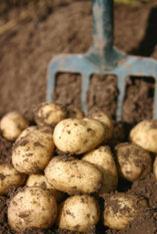
Growers can improve results in potato crops by switching to a methiocarb-based slug control strategy as growers deal with reduced metaldehyde rates in 2009, according to a leading agronomist.
Earlier this year, some metaldehyde products were re-approved but with use on potatoes restricted by a maximum individual dose of 350g of metaldehyde active ingredient per hectare and a maximum total dose per crop of 700g.
These restrictions effectively rule out the ‘little and often’ approach of applying mini metaldehyde pellets with every blight spray.
However, Scottish Agronomy’s Eric Anderson has trialled methiocarb-based products, finding a higher number of baiting points delivered by some metaldehyde products.
“The optimum time to begin slug control is at 50-75 per cent canopy closure, which crops usually reach early in July. At this time, the canopy’s starting to create moist, slug conducive conditions on the soil surface but still allows uniform pellet distribution. Full rate application of methiocarb pellets, such as Draza forte at 3.75 kg/ha, will have the biggest initial impact on slug population at this timing,” said Anderson.
“Soil type, rotation with oilseed rape, varietal susceptibility, irrigation, surface moisture and stage of crop development are risk factors to consider but slug activity should always be confirmed by bait trapping,” he added.
Slug activity often peaks in September and maturing tubers are also becoming more attractive to slugs, so this is a high-risk period when Anderson advises targeting use of methiocarb pellets.
Peter Stacey, Bayer CropScience’s product manager for methiocarb slug pellets, adds that the problem of metaldehyde getting into river water has certainly focused attention on application practices.
He said: “Methiocarb is far less soluble and binds tightly to soil particles so it is highly unlikely to appear in water courses. However, the industry’s best practice application guidelines apply to the use of all pellet types and they should only be applied by NPTC qualified operators."



